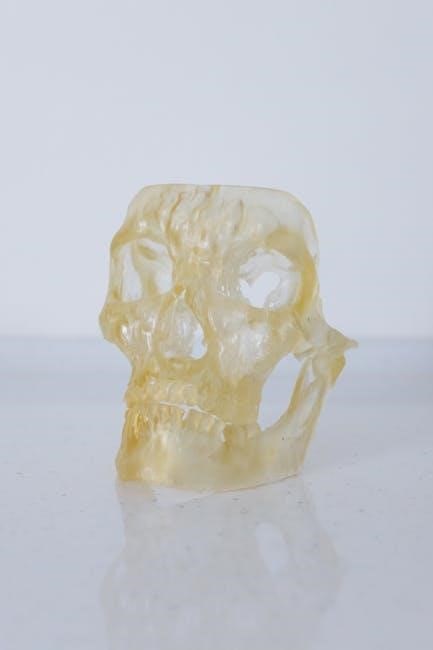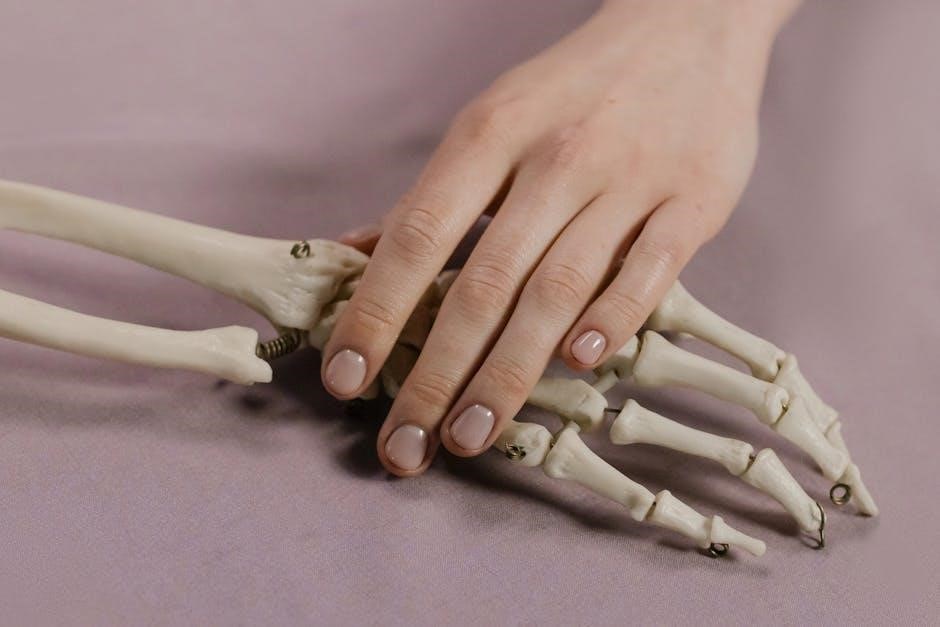Critical Thinking, Clinical Judgment, and the Nursing Process
Critical thinking and clinical judgment are essential for effective nursing practice. Study guides emphasize the nursing process, assessment, diagnosis, and patient care planning to enhance decision-making skills.
1.1. The Nursing Process: Assessment, Diagnosis, Planning, Implementation, and Evaluation
The nursing process is a systematic approach to patient care, emphasizing assessment, diagnosis, planning, implementation, and evaluation. Study guides detail these phases, providing exercises to enhance understanding and application. Assessment involves gathering patient data, while diagnosis identifies specific health issues. Planning outlines goals and interventions, implementation executes the plan, and evaluation measures outcomes, ensuring evidence-based, patient-centered care.
1.2. Developing Clinical Judgment in Medical-Surgical Nursing
Developing clinical judgment involves critical thinking and experience. Study guides offer case studies and exercises to enhance nurses’ ability to analyze patient data, prioritize care, and make sound decisions. These tools help bridge theory and practice, fostering confident, evidence-based practice in dynamic healthcare environments, ensuring optimal patient outcomes and professional growth for nurses.

Evidence-Based Practice in Medical-Surgical Nursing
Evidence-based practice integrates research, clinical expertise, and patient preferences. Study guides provide reliable sources and strategies to apply best practices, improving patient outcomes and care quality.
2.1. Sources of Evidence-Based Practice in Nursing
Evidence-based practice relies on credible sources like research studies, clinical guidelines, and expert recommendations. Study guides highlight these sources, emphasizing their role in improving patient care. Nurses use these resources to stay updated on best practices, ensuring safe and effective interventions. Patient preferences and outcomes data also inform decisions, making practice patient-centered and evidence-driven.
2.2. Applying Evidence-Based Practice to Patient Care
Applying evidence-based practice involves integrating research findings into patient care. Study guides provide practical strategies for implementing best practices, ensuring care is safe, effective, and patient-centered. Nurses use evidence to guide assessments, planning, and interventions, improving outcomes. This approach fosters critical thinking and continuous improvement, keeping care aligned with current research and clinical expertise.

Assessment and Management of Clinical Problems
Accurate assessment and management of clinical problems are vital in med-surg nursing. Study guides emphasize physical assessment techniques and diagnostic tests to guide interventions and improve patient outcomes.
3.1. Vital Signs and Physical Assessment Techniques
Accurate measurement of vital signs and physical assessment techniques are foundational in med-surg nursing. Study guides detail methods for assessing heart rate, blood pressure, respiratory rate, and oxygen saturation. They also cover inspection, palpation, percussion, and auscultation to identify abnormalities. Practice exercises and case studies help nurses refine these skills, ensuring comprehensive patient evaluations and informed clinical judgments.
3.2. Diagnostic Tests and Laboratory Interpretation
Study guides emphasize the importance of understanding diagnostic tests and interpreting lab results. They provide detailed explanations of common tests, abnormal findings, and their clinical implications. Practice exercises and case studies help nurses apply this knowledge, ensuring accurate interpretation of lab values and informed clinical decisions to guide patient care effectively.

Cultural Competence and Issues in Nursing Practice
Study guides provide strategies for culturally competent care, addressing ethical issues and diverse patient backgrounds to ensure patient-centered, respectful interactions in nursing practice.
4.1. Understanding Cultural Diversity in Patient Care
Cultural diversity in patient care requires nurses to recognize and respect varying beliefs, values, and practices. Study guides emphasize the importance of cultural competence to address health disparities, improve communication, and provide individualized care. By understanding these elements, nurses can deliver culturally sensitive and patient-centered care, fostering trust and better health outcomes.
4.2. Ethical Considerations in Medical-Surgical Nursing
Ethical considerations in medical-surgical nursing involve upholding patient autonomy, confidentiality, and dignity. Study guides highlight the importance of informed consent, addressing moral dilemmas, and advocating for patients’ rights. Nurses must also navigate end-of-life care decisions and cultural sensitivity, ensuring ethical practices align with professional standards and promote patient-centered care.
Med Surg Certification Exam Preparation
Effective exam preparation involves practice tests, digital flashcards, and study guides. Focus on understanding content, managing time, and applying clinical knowledge to ensure success in the ANCC MEDSURG-BC exam.
5.1. Overview of the ANCC MEDSURG-BC Exam
The ANCC MEDSURG-BC exam evaluates clinical knowledge and skills in medical-surgical nursing. It covers adult health, gerontological nursing, and professional standards. The exam consists of multiple-choice questions, focusing on patient care, pharmacology, and evidence-based practices. Study guides and practice tests are essential for preparation, ensuring nurses demonstrate expertise and meet certification requirements effectively.
5.2. Time-Saving Strategies for Exam Success
Maximize your study time with targeted strategies. Prioritize high-yield topics, use active learning techniques like flashcards, and allocate specific time blocks for focused study. Practice tests help identify weak areas, allowing for efficient review. Utilize mnemonics and concept maps to organize information. Stay updated with the latest nursing guidelines to ensure comprehensive preparation and confidence on exam day.

Key Medical-Surgical Nursing Concepts
Focus on critical care, hemodynamic monitoring, and advanced life support. Understand cardiovascular, respiratory, and neurological system pathophysiology for effective patient management and care planning.
6.1. Critical Care Nursing: Hemodynamic Monitoring and Advanced Life Support
Critical care nursing involves advanced hemodynamic monitoring, including invasive and non-invasive techniques. Study guides emphasize understanding cardiovascular dynamics, interpreting arterial waveforms, and managing vasoactive medications. Advanced life support skills, such as mechanical ventilation and cardiac rhythm interpretation, are also highlighted to ensure optimal patient outcomes in high-acuity settings.
6.2. Cardiovascular, Respiratory, and Neurological Systems: Pathophysiology and Management
Study guides explore the pathophysiology of cardiovascular, respiratory, and neurological disorders, emphasizing assessment techniques and interventions. Topics include heart failure, chronic obstructive pulmonary disease, and cerebrovascular accidents. Management strategies focus on optimizing oxygenation, maintaining hemodynamic stability, and preventing complications like acid-base imbalances or increased intracranial pressure. Evidence-based practices guide nurses in providing holistic, patient-centered care.

Common Medical-Surgical Conditions and Interventions
Study guides cover gastrointestinal, renal, and musculoskeletal disorders, along with integumentary, immune, and oncological conditions. Interventions focus on symptom management, wound care, and supportive therapies.
7.1. Gastrointestinal, Renal, and Musculoskeletal Disorders
Study guides detail gastrointestinal disorders, such as Crohn’s disease and ulcerative colitis, focusing on symptom management. Renal conditions, including chronic kidney disease, emphasize fluid and electrolyte balance. Musculoskeletal disorders address arthritis and fractures, highlighting pain relief and mobility restoration. Nursing interventions include dietary adjustments, medication adherence, and physical therapy to improve patient outcomes and quality of life.
7.2. Integumentary, Immune, and Oncological Disorders
Study guides cover integumentary disorders like skin cancers and pressure ulcers, focusing on wound care. Immune disorders, such as HIV and autoimmune diseases, highlight infection control. Oncological care emphasizes chemotherapy management, symptom relief, and psychosocial support. Nursing interventions include skin assessments, immune modulation, and pain management to enhance patient comfort and improve overall outcomes in these complex conditions.

Pharmacological Interventions in Medical-Surgical Nursing
Pharmacological interventions focus on safe medication administration, patient safety, and monitoring for adverse effects. Study guides emphasize evidence-based therapies for chronic and acute conditions, ensuring effective patient care.

8.1. Medication Management and Patient Safety
Medication management is crucial for patient safety, emphasizing accurate administration and monitoring. Study guides highlight strategies to reduce errors, such as barcode scanning and reconciliation. Nurses must understand drug interactions, side effects, and patient education to ensure safe practice and optimal outcomes in medical-surgical settings.
8.2; Pharmacological Therapies for Chronic and Acute Conditions
Pharmacological therapies are tailored to manage chronic conditions like hypertension and diabetes, as well as acute issues such as infections and pain. Study guides emphasize evidence-based drug regimens, dosing adjustments, and potential interactions. Nurses must prioritize personalized treatment plans, patient education, and monitoring for adverse effects to ensure safe and effective care in medical-surgical settings.

Wound Care and Pain Management
Wound care involves principles of healing and dressing techniques. Pain management focuses on assessment and multimodal strategies to ensure effective patient comfort in medical-surgical settings.
9.1. Principles of Wound Healing and Dressing Techniques
Wound healing involves stages like inflammation, proliferation, and remodeling. Dressing techniques promote a moist environment, enhance tissue oxygenation, and prevent infection. Study guides emphasize selecting appropriate dressings, maintaining sterility, and monitoring healing progress. Regular assessment and documentation are crucial for optimal outcomes in medical-surgical nursing practice, ensuring patient comfort and effective wound management.
9.2. Pain Assessment and Multimodal Pain Management Strategies
Pain assessment is critical to effective management. Tools like the 0-10 pain scale help quantify pain intensity. Multimodal strategies combine pharmacological (opioids, NSAIDs, adjuvants) and non-pharmacological methods (relaxation, heat/cold therapy). Individualizing care ensures patient-specific approaches, improving comfort and functional outcomes. Regular reassessment and documentation guide adjustments, optimizing pain relief while minimizing adverse effects in medical-surgical nursing practice.

Case Studies and Practice Exercises
Case studies and exercises enhance clinical judgment by simulating real patient scenarios. Practice questions and NCLEX-style tests reinforce learning, preparing nurses for certification and improving patient care skills effectively.
10.1. Case Studies for Clinical Judgment Development
Case studies in med-surg nursing study guides provide realistic patient scenarios to enhance clinical judgment. These exercises simulate real-life situations, requiring nurses to assess, diagnose, and prioritize care. Through analysis of symptoms, lab results, and treatment options, nurses develop critical thinking and decision-making skills. Practical application of knowledge improves patient outcomes and prepares nurses for certification exams and complex clinical challenges effectively.
10.2. Review Questions and Practice Tests for Exam Preparation
Med-surg study guides include review questions and practice tests to prepare nurses for certification exams. These resources feature NCLEX-style questions, case studies, and rationales to assess knowledge and identify areas for improvement. Digital formats offer convenient access, while comprehensive coverage ensures mastery of key concepts. Regular practice builds confidence and competence, helping nurses excel in exams and clinical practice.